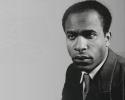Ancient Competencies
If you find a broken link in this list, please report it to the webmaster.
FANON Frantz
 |
Psychiatrist, philosopher and anti-colonial activist Blida-Joinville Psychiatric Hospital (Algeria) and National Liberation Front (FLN) |
Origins & Education
Born on July 20, 1925, in Fort-de-France, Martinique, Frantz Fanon grew up in a middle-class family. During World War II, he left Martinique to join the Free French Forces. This experience profoundly shaped his understanding of racism and colonialism. After the war, he pursued medical and psychiatric studies in Lyon, where he obtained his doctorate in 1951. During this period, he was strongly influenced by existentialist and phenomenological philosophers such as Jean-Paul Sartre and Maurice Merleau-Ponty. His medical thesis, published in 1952 under the title "Black Skin, White Masks," explores the psychological impact of colonialism and racism on Black people and constitutes one of his major works.
Scientific Career
In 1953, Fanon was appointed head of department at the Blida-Joinville psychiatric hospital in Algeria. There, he revolutionized therapeutic practices by introducing more humane methods and taking into account the sociocultural context of patients. Confronted daily with the psychological trauma caused by the Algerian War that began in 1954, he developed a critical analysis of colonial psychiatry and implemented innovative collective therapies. His clinical approach was inseparable from his political commitment: he resigned from his position in 1956 to join the Algerian National Liberation Front. As a member of the editorial board of the newspaper "El Moudjahid," he articulated a theoretical perspective on decolonization that culminated in his posthumous work "The Wretched of the Earth" (1961), dictated while he was suffering from leukemia.
Distinctions & Recognition
Although Frantz Fanon did not receive official academic distinctions during his lifetime, his intellectual legacy has been widely recognized after his premature death at the age of 36. Several institutions now bear his name, including the Frantz Fanon Center in Turin, dedicated to transcultural psychiatry, and various streets and educational establishments in France and formerly colonized countries. His personal archives, preserved at IMEC (Institute for Contemporary Publishing Archives), constitute a valuable documentary heritage for researchers. The Frantz Fanon Foundation, created by his daughter Mireille, perpetuates his memory and ideas through conferences and publications. In 2011, on the fiftieth anniversary of his death, UNESCO paid tribute to his contribution to understanding the mechanisms of colonial domination.
Impact & Influence
Fanon's work has profoundly influenced liberation movements in Africa and around the world. His thinking has nourished postcolonial theories, Black studies, and cultural studies. His analysis of the psychological effects of colonization and racism remains strikingly relevant today. His concepts such as "colonial alienation," "liberating violence," and the critique of the "national bourgeoisie" have inspired numerous intellectuals and activists. His vision of decolonization as a process of total liberation—political, economic, and psychological—continues to illuminate contemporary debates on colonial legacies. As a thinker of concrete universalism, Fanon defends a radical humanist vision where each culture participates in the development of a global civilization. His influence can be found in the works of Édouard Glissant, Stuart Hall, Achille Mbembe, Homi Bhabha, and many other contemporary theorists.
Further Reading
- Cherki, Alice (2000). Frantz Fanon: A Portrait (Nadia Benabid, trans.). Ithaca: Cornell University Press.
- Gordon, Lewis R. (2015). What Fanon Said: A Philosophical Introduction to His Life and Thought. New York: Fordham University Press.
- Macey, David (2000). Frantz Fanon: A Biography. London: Verso Books.
- Frantz Fanon Archives at IMEC: https://imec-archives.com/archives/fonds/178FNN
- Frantz Fanon Foundation: http://fondation-frantzfanon.com